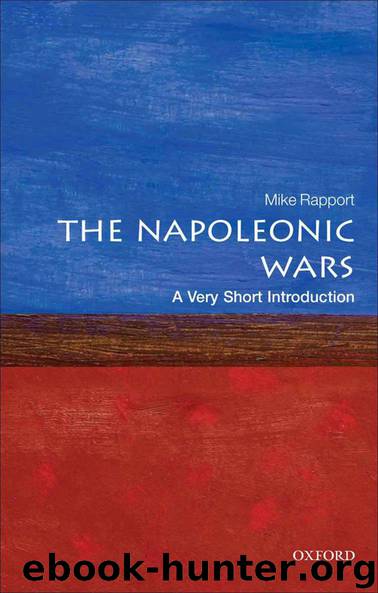The Napoleonic Wars: A Very Short Introduction (Very Short Introductions) by Mike Rapport

Author:Mike Rapport [Rapport, Mike]
Language: eng
Format: epub, mobi
Publisher: Oxford University Press, USA
Published: 2013-01-30T16:00:00+00:00
6. Public bonfires of British contraband, like this one in Amsterdam in 1812, were aimed at reinforcing Napoleon’s blockade of Europe, but they also appalled mercantile communities already suffering from the commercial disruption of the ‘Continental System’
Chapter 5
Soldiers and civilians
The horrors unleashed by the French Wars were captured in the stark, disturbing prints of the Spanish artist, Francisco Goya. The Disasters of War, their dark lines etched in 1810–20, freeze in time the agonies and brutality of the guerrilla war in Spain: women being raped, the limp corpses of civilians dangling from gibbets, a priest garrotted, a soldier on the verge of having his head cleaved in two by an axe. There are no heroes or villains: in some of these etchings, it is impossible to distinguish between Spanish guerrilla and French soldiers, between aggressor and victim. The violence is indiscriminate, senseless, but therein lies the horror: anyone could become a victim, at any time (see Figure 7).
The French Wars all but shattered the eighteenth-century notion that there were ‘rules’ to warfare. The Swiss jurist Emmerich de Vattel, whose 1758 work The Law of Nations was an influential attempt to outline the rules of conduct (‘the proper form’) of international relations in war and peace, including the definition of a ‘just war’ and the treatment of civilians and property, wrote that ‘the Nations of Europe almost always carry on war with great forbearance and generosity’. Such ideas were overlaid by the cosmopolitanism of the Enlightenment—the idea that all people shared such fundamental attributes as reason and certain rights and were governed by similar, natural laws. The total wars of the French Revolution and Napoleon did not, however, only destroy these illusions because of their stark brutality. It was also that there was a dangerous contradiction within the Enlightenment’s humanitarianism. Within that body of ideas there lurked a sinister virus: what of those who did not conform to the ‘rules’ that limited warfare? What of people such as rebels, guerrillas, bandits, or non-European ‘savages’ who fought a different type of warfare from the set-piece battles envisaged by the eighteenth-century jurists? And what of states deemed by their opponents to have breached the laws of warfare, or to be waging an ‘unjust’ war? Vattel himself provided the answer: they were ‘monsters’ who could be exterminated.
Download
The Napoleonic Wars: A Very Short Introduction (Very Short Introductions) by Mike Rapport.mobi
This site does not store any files on its server. We only index and link to content provided by other sites. Please contact the content providers to delete copyright contents if any and email us, we'll remove relevant links or contents immediately.
| Belgium | France |
| Germany | Great Britain |
| Greenland | Italy |
| Netherlands | Romania |
| Scandinavia |
Room 212 by Kate Stewart(5129)
The Crown by Robert Lacey(4818)
Endurance: Shackleton's Incredible Voyage by Alfred Lansing(4785)
The Iron Duke by The Iron Duke(4362)
The Rape of Nanking by Iris Chang(4217)
Joan of Arc by Mary Gordon(4116)
Killing England by Bill O'Reilly(4006)
Say Nothing by Patrick Radden Keefe(3990)
I'll Give You the Sun by Jandy Nelson(3449)
Shadow of Night by Deborah Harkness(3372)
Hitler's Monsters by Eric Kurlander(3344)
Mary, Queen of Scots, and the Murder of Lord Darnley by Alison Weir(3211)
Blood and Sand by Alex Von Tunzelmann(3206)
Eleanor & Park by Rainbow Rowell(3180)
Darkest Hour by Anthony McCarten(3134)
Margaret Thatcher: The Autobiography by Thatcher Margaret(3085)
Book of Life by Deborah Harkness(2941)
Red Famine: Stalin's War on Ukraine by Anne Applebaum(2936)
The One Memory of Flora Banks by Emily Barr(2866)
